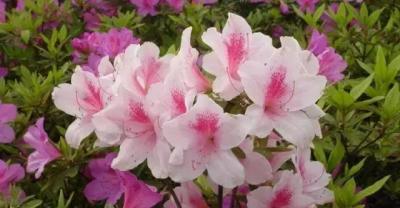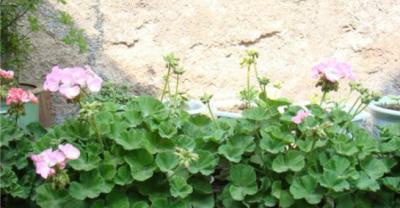There are four steps to growing flowers, and it is no longer difficult to grow flowers.
Do you always envy when you see "other people's garden"? How can we feed those flowers and plants well? Here is a summary of some experience to share with you, a primary flower lover must master the soil, watering, fertilizer and light of the four most basic knowledge, coupled with your love and patience, so that the spring garden is not far from you!
Flower cultivation Quadrilogy
Soil
Soil is the most basic thing to raise flowers. Most flowers like acidic or slightly acidic soil rich in organic matter. The easiest way is to buy ready-made nutritious soil, but you can also configure the soil yourself.
Common potted flowers can choose 1 part of rotten leaf soil, 1 part of garden soil, half part of stable fertilizer soil, half part of rice chaff ash or 1 part of garden soil and 2 parts of rotten leaf soil, such as asparagus, melon leaf chrysanthemum, poinsettia, four seasons begonia and so on.
Can also choose ordinary mud, it is a natural humus soil, the soil is loose and acidic, suitable for planting, such as camellia, rhododendron, Milan, gardenia, jasmine and so on.
The soil configuration of foliage plants: 2 parts of rotten leaf soil, 2 parts of fertile soil, 1 part of sand or stone, and then adding rotten barnyard manure accounts for about 5% of the total weight.
Soil configuration of epiphytic cactus and succulent plants: 3 parts of rotten leaf soil, 3 parts of coarse sand, 1 part of plant ash. The disposition of acid-tolerant flower soil: 4 parts of rotten leaf soil, 2 parts of garden soil, 1 part of stone and 1 part of river sand.

Watering
Watering is a very important link in flower cultivation. It is necessary to grasp the principle of "no dry, no watering, watering thoroughly".
Watering potted flowers should be treated according to plant species, growth stage, pot size and seasonal climate.
It can be watered more for plants that like damp, such as melon-leaf chrysanthemum and primrose, but less for plants that like drought, such as five-needle pine, iron tree and succulent cactus. In addition, plants should be properly watered during the period of long leaves and flowering, and less water should be watered when they bear fruit. Water less or control watering when you are dormant in winter. When the spring turns warm, the watering water should increase gradually, the summer temperature is high, the basin soil is easy to dry, the water demand is large, and the watering water can be gradually reduced in autumn.
Generally speaking, Rain Water is the best to water the potted flowers. if you water them with tap water, it is best to store them in a small tank for 2 to 3 days and water them again after the chlorine in the water volatilizes.

Fertilizer application
The fertilizers for raising flowers in the family are: organic fertilizer, which is generally made of scraps such as soybeans, peanuts and rapeseed, which is rich in nitrogen, phosphorus and potassium, and is commonly used in potted flowers. Mature bean cakes and rapeseed cakes are sold in the flower and bird market; inorganic fertilizers can generally be purchased in the market, such as urea, calcium superphosphate, potassium dihydrogen phosphate, etc.; plant ash, alkaline fertilizer, contains more nutrients such as iron, calcium and magnesium.
Under normal circumstances, when the symptoms such as light leaf color, short plant, light flowering color, small flowers and spots in leaf veins appear, it shows that the plant is lack of nutrition and should be supplemented with nutrients and fertilized in time. The key to fertilization is to apply more thin fertilizer, do not thicken, generally apply once in 15 days or so.
It is best to fertilize potted flowers in the growing period or one month after flowering, when they germinate in spring, when they germinate for the second time in autumn, before flowering and one month after changing pots. The time without fertilization is the flowering period and the dormant period in summer and winter.
Many flower lovers like to fertilize newly bought potted flowers, which is not appropriate. generally, newly bought flowers have good soil or have been fertilized, which can maintain their living for 2 months. in order to make potted flowers thrive, it is not too late to apply fertilizer after 2 months.

Light
Flowers are usually divided into two categories: like Yang and like Yin.
Those that grow well in the sun, such as rose, pomegranate, chrysanthemum, daffodils, Scutellaria barbata, sorrel, lotus and so on, are Xiyang flowers. If the light intensity of these flowers is not enough, they often show slender branches, elongated internodes, thinner leaves, incorrect leaf color, and are vulnerable to diseases and insect pests.
Xiyin flowers mostly do not like strong light, especially in the high temperature season need to be given varying degrees of shade, and pay attention to the appropriate increase of air humidity. Like the four seasons begonia, iron fern, glass green, asparagus, inverted hanging golden bell, orchid, gentleman orchid, rhododendron, tortoise back bamboo, evergreen and so on.
General potted flowers, in flowering, in order to prolong flowering time, can appropriately reduce strong light, such as rose, chrysanthemum and so on. But there are also some flowers that can blossom well only in strong light, such as water lilies, half-branch lotus and so on. There are also some flowers that do not like strong light in summer and cannot blossom without light in winter, such as geranium, begonia, eight immortal flowers, golden bell and so on.
Generally speaking, you should know whether your flowers like shade or light, and then put them according to the light at home. However, it should be noted that shade-resistant flowers should be put in bright places to bask in the sun after a period of time. Long-term shade is not good!

As long as you master these four steps
Growing flowers is no longer a difficult task!
- Prev

Experience of Flower cultivation: some points for attention in Family Flower cultivation
Friends, as we are about to enter winter, what about the plants at home? In fact, growing flowers is easy to say, but difficult to say. Xiao Mei will introduce you today.
- Next

45 kinds of flowers, for those who love flowers!
Do you have a few plants or potted flowers at home? Do they grow well? Do you know how many days these flowers and plants should be watered and kept indoors...
Related
- What if the leaves of potted flowers turn yellow?
- Florescence Control of several Flowers
- Anti-freezing technology and post-freezing nursing technology of flowers
- What is the classification of flowers? What are the common methods of flower classification?
- Prevention and control of alkali and acid damage of flowers in courtyard
- Technology of Anti-freezing and restoring growth of Flower seedlings in greenhouse and greenhouse
- How does flower fertilization not hurt the root? Fertilization technology of flowers
- Key points of disinfection in flower greenhouse
- Several pesticides that are banned or used cautiously in flowers
- How to fertilize the flowers that watch the leaves?

